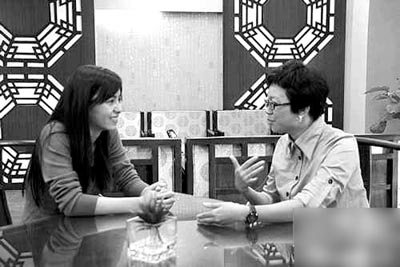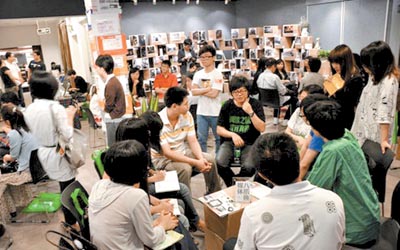|

Wang Yuanyuan, Luo Songsong
cheekywang@hotmail.com
THE second “living books” service, featuring people acting as “books,” was held at Luohu District Library on Dec. 11 and attracted many readers to a new and fun experience.
Living books have been offered at the library since Nov. 4. A section of the library, instead of being filled with shelves of books, is filled with people who answer questions and share their experiences with readers.

The second living books event was themed “Slow Living.” Five people from different lines of work — including performance agent Zhang Chenghao, local “slow living” bar owner Jumi, cyclist and traveler Hong Shujing, drama maker Wang Zixu and editor Guo Meng — were selected as living books to introduce how to have a meaningful and elegant “slow life.”
Each living book gave a 10- to 15-minute introduction about slow living and then initiated conversations on the topic with readers.
“This kind of reading is a mutual communication full of unknowns and joys,” cartoonist Liu Wei said. “You don’t know what readers are going to ask next, so you need to keep thinking.”
Liu was a living book for the first activity, themed “Careers.”
Shanghai was one of the first cities in China to pilot this type of library service. Shanghai Human Relation Community Development Center first organized such activities in May 2011, but the program was suspended for about a year due to a lack of financial support.

“Many people thought this form of library service was nothing but tricks and would not go far. I think that as long as the readers like it, it is meaningful,” said Shi Limei, curator of Luohu District Library.
“Many netizens are worried about our financial support. It is not a problem for us. We have enough rooms at the library and all these living books are volunteers. The only cost is the expense of making promotion posters, but we can cover it with the money made from other reading activities,” she said.
Novelist and sinologist Wang Fei also thought it was a creative service that could be promoted across the country.
One of the living books in Luohu District Library’s first activity, Wang is also one of the service’s organizers, in charge of selecting topics and new “living books.”
“It was an interesting experience. Compared with print books, I can gain more thoughts and understanding through the interactive activities. They read me, and at the same time I read them,” Wang said.
The Luohu library leaders plan to hold the event at least once a month and will adjust the schedule according to readers’ needs. Living book events will also be held in libraries in Hongfa Temple and Guiyuan, Huangbei, Nanhu and Dongxiao subdistricts.
All residents are welcome to apply to become part of the “living library.”
Shi said more than 90 people have applied, mostly local white-collar workers.
“During the living books service, any commercial promotion is prohibited,” Shi added.
To ensure its role as a public activity, all living books are gathered together and told the events’ rules.
“For example, we told the ‘books’ for the slow-living activity that they were only allowed to introduce and share their slow life and could not sell anything related to their companies, shops and other products,” she said. “We also sent staff to supervise their speeches and stop them if they did so.”
Future topics could include stories on themes of “intangible heritage,” “old Luohuers,” “IT industry,” and “fashion in Luohu.”
“The living books in these fields present the past and the future of Luohu District, and they are also stories of Shenzhen,” Shi said.
The third activity, themed “Stories in the Past,” will be held Jan. 13 at the library. It will feature living books from North China, South China and local Shenzhen villages to share their stories of old Shenzhen.
People interested in becoming a living book can download an application from the library’s website, www.szlhlib.com.cn, and send the application form to the library’s customer service table or to lhzrtsg@163.com. Living books are not paid.
|

